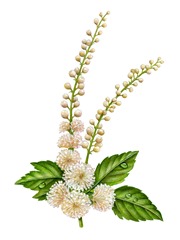 A recent study using black cohosh, demonstrates a new addition to a natural medicine strategy for addressing PCOS. One hundred women with PCOS were recruited and seen in a clinic in Egypt. Women were randomly assigned to receive either 40 mg/day of black cohosh for 10 days or 100 mg/day of clomiphene for 5 days. (Clomiphene citrate is a conventional pharmaceutical prescription used as a first line approach to induce ovulation.) Treatments were given starting on day two of each cycle and continued for 3 consecutive cycles. Blood tests included follicle-stimulating hormone (FSH), luteinizing hormone (LH) and progesterone. Transvaginal ultrasound was performed to document follicular size and growth as well as endometrial thickness. If a follicle achieved a size of 18 mm or greater, human chorionic gonadotropin (HCG) was given and then intercourse was recommended.
A recent study using black cohosh, demonstrates a new addition to a natural medicine strategy for addressing PCOS. One hundred women with PCOS were recruited and seen in a clinic in Egypt. Women were randomly assigned to receive either 40 mg/day of black cohosh for 10 days or 100 mg/day of clomiphene for 5 days. (Clomiphene citrate is a conventional pharmaceutical prescription used as a first line approach to induce ovulation.) Treatments were given starting on day two of each cycle and continued for 3 consecutive cycles. Blood tests included follicle-stimulating hormone (FSH), luteinizing hormone (LH) and progesterone. Transvaginal ultrasound was performed to document follicular size and growth as well as endometrial thickness. If a follicle achieved a size of 18 mm or greater, human chorionic gonadotropin (HCG) was given and then intercourse was recommended.
While at baseline, both the black cohosh and clomiphene groups had similar FSH, LH and FSH/LH rations, at the end of the treatment period, the black cohosh group had a significantly greater reduction in the LH level as well as the FSH/LH ratio. After receiving black cohosh, this group also had significantly greater progesterone levels and endometrial thickening. Remarkably, the black cohosh group had more pregnancies (7 vs. 4), although in terms of statistical power and 50 women in each group, this did not reach statistical significance. There were also 2 twin pregnancies in the black cohosh group vs. 1 in the clomiphene group. Again, this was not statistically significant. The black cohosh group had 1 miscarriage and 1 case of mild hyperstimulation compared with the clomiphene group that saw no miscarriages, 1 mild case and 1 moderate case of hyperstimulation. And again, this was not statistically significant.
Commentary: Polycystic ovarian syndrome (PCOS) is one of the most challenging endocrinological disorders in women. It impacts not only the menstrual cycle, fertility, and physical manifestations of androgen excess (acne, hirsutism, hair loss), it increases the risk of long term significant health issues including type 2 diabetes, dyslipidemia, hypertension and endometrial cancer. While the underlying cause of polycystic ovarian syndrome is dominantly insulin resistance, it is often the symptoms of amenorrhea, oligomenorrhea or infertility and the associated lack of ovulation or only infrequent ovulation that brings women to the medical office.
This use of black cohosh and its apparent effect on inducing ovulation is a very useful study in the complex and challenging clinical management of women with PCOS. Adding black cohosh to natural medicine strategies that increase insulin sensitivity, reduce androgen excess, reduce conversion to the more active form of testosterone in the skin, while all the time being mindful of reducing the risk of future diseases such as type 2 diabetes, cardiovascular disease and endometrial cancer is an advancement in treatment options. We are left with a desire to better understand optimal black cohosh dosing for this purpose and larger studies to see the impact on regular ovulation and rates of pregnancy.
Reference: Kamel HH. Role of phyto-oestrogens in ovulation induction in women with polycystic ovarian syndrome. Eur J Obstet Gynecol Reprod Biol. May 2013;168(1):60-63.

